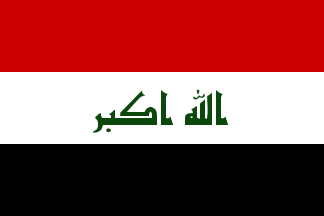After learning that the vile Islamic State, newly proclaimed in Iraq, has already ordered the disgusting practice of female genital mutilation for all women living in Mosul, we should not be surprised that all the other repulsive elements of Islamic law: the compulsory bagging of the women & mulcting of the Christians, are also on the cards. The following article from The Telegraph on Friday (hat-tip to John Galt @JohnGGalt) focuses on the imposing of the niqab, but the jizya tax is also mentioned, if only briefly & obliquely:
|
Islamic State orders women to wear full-face veil or risk 'serious punishment'
Women in Iraqi city of Mosul told to wear full-face veils by jihadist group Islamic State, who say it will prevent them "falling into humiliation and vulgarity"
The Sunni insurgents, who have declared a caliphate in parts of Iraq and Syria and have threatened to march on Baghdad, also listed guidelines on how veils and clothes should be worn, part of a campaign to violently impose their radical brand of Islam. "The conditions imposed on her clothes and grooming was only to end the pretext of debauchery resulting from grooming and overdressing," said Islamic State - formerly known as Isis - in a statement. "This is not a restriction on her freedom but to prevent her from falling into humiliation and vulgarity or to be a theatre for the eyes of those who are looking."
"Anyone who is not committed to this duty and is motivated by glamour will be subject to accountability and severe punishment to protect society from harm and to maintain the necessities of religion and protect it from debauchery," said the Islamic State. The insurgents have been systematically stamping out any religious or cultural influences they deem non-Islamic since their lightning sweep through the north. US military and Iraqi security officials estimate the Islamic State has at least 3,000 fighters in Iraq, rising towards 20,000 when new recruits since last month's advance are included. The Islamic State provided guidelines on how women should dress in Mosul, one of Iraq's biggest cities. The hands and feet must be covered. Wear shapeless clothes that don't hug the body. No perfume. The insurgents run vice patrols in Mosul which answer to a morality committee which has shut Mosul's college of fine arts and physical education, knocked down statues of famous poets and banned smoking and waterpipes. Women have been told to never walk unaccompanied by a male guardian. The Islamic State even ordered shopkeepers to cover their store mannequins with full-face veils. A man was recently whipped in public for sexually harassing a woman. Islamic State militants view Iraq's majority Shi'ites as infidels who deserve to be killed and have told Christians to either convert to Islam, pay a religious levy or face death. Islamic State's radical views have alarmed many Iraqis, but there are no signs that their leaders will be able to regain control of captured areas anytime soon. Since the army's virtual collapse in the face of the Sunni militant onslaught, Kurdish peshmerga fighters and Shi'ite militias have emerged as the only forces that seem capable of challenging the Islamic State. Political paralysis has eroded faith in Iraqi leaders. Politicians have been in deadlock over forming a new government since an election in April, and the next step – choosing a prime minister – may prove far more difficult. Iraq's parliament elected a senior Kurdish lawmaker president on Thursday, a significant step in a delayed process to create a government capable of uniting the country and countering insurgents. Shi'ite Prime Minister Nuri al-Maliki has ruled since the election in a caretaker capacity, defying demands from minority Sunnis and Kurds that he step aside for a less divisive figure. Even some fellow Shi'ites oppose his bid for a third term. Critics say Maliki has alienated Sunnis, deepening sectarian divisions that have benefited the Islamic State. |
|
|

 Islamic State, the jihadist group that seized large swathes of northern Iraq last month, has warned women in the city of Mosul to wear full-face veils or risk severe punishment.
Islamic State, the jihadist group that seized large swathes of northern Iraq last month, has warned women in the city of Mosul to wear full-face veils or risk severe punishment.
 A cleric in Mosul told Reuters that Islamic State gunmen had shown up at his mosque and ordered him to read their warning on loudspeakers when worshippers gather.
A cleric in Mosul told Reuters that Islamic State gunmen had shown up at his mosque and ordered him to read their warning on loudspeakers when worshippers gather.
No comments:
Post a Comment